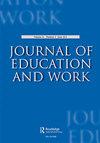“我不明白”:首先是家庭毕业生认识到并调动就业资本
IF 1.7
Q2 EDUCATION & EDUCATIONAL RESEARCH
引用次数: 3
摘要
在复杂的劳动力市场中取得成功需要精明的计划,准备和远见,特别是在高等教育大众化的背景下,提高毕业生竞争力,以及将就业责任放在个人身上的就业能力论述。毕业生就业结果明显较弱的群体是家庭中第一个上大学的学生,这一群体通常代表着背景的多样性和交叉的公平类别。通过对即将完成的澳大利亚第一家庭(FiF)学生、应届毕业生和校友的采访和调查,本文探讨了参与者如何体验和制定就业能力。通过运用皮埃尔·布迪厄(Pierre Bourdieu)在资本理论方面的工作,本文对FiF学生毕业生求职的经验提供了有价值的见解,特别是他们现有的资本,包括那些具有社会、文化和象征性质的资本,如何与就业市场相互作用,以实现(或以其他方式)理想的毕业生就业。这项研究的结果指出了FiF队列实现职业目标的一些迫切需要的策略。本文章由计算机程序翻译,如有差异,请以英文原文为准。
‘I don’t understand it’: first in family graduates recognising and mobilising capitals for employment
ABSTRACT Success in a complex labour market requires astute planning, preparation and foresight, particularly within the context of the massification of higher education, increasing graduate competitiveness, and a discourse of employability which places the onus of employment on the individual. A cohort experiencing noticeably weaker graduate employment outcomes are students who are the first in their family to attend university, a group often representing a diversity of backgrounds and intersecting equity categories. Drawing on interviews and surveys of near completing Australian first in family (FiF) students, recent graduates and alumni, this article explores how employability was experienced and enacted by participants. Through the application of Pierre Bourdieu’s work on capital theory, the article contributes valuable insights into the experience of FiF students’ graduate employment seeking, specifically how their existing capitals, including those that are social, cultural and symbolic in nature, interacted with the job market to achieve (or otherwise) desirable graduate employment. Findings from this study point to a number of urgently needed strategies for the FiF cohort to achieve professional goals.
求助全文
通过发布文献求助,成功后即可免费获取论文全文。
去求助
来源期刊

Journal of Education and Work
EDUCATION & EDUCATIONAL RESEARCH-
CiteScore
2.70
自引率
14.30%
发文量
40
期刊介绍:
The Journal of Education and Work is an international forum for academic research and policy analysis which focuses on the interplay of the education and economic systems. The journal examines how knowledge, skills, values and attitudes both about and for work and employment are developed within the education system. The journal also explores the various forms of industrial training and accreditation in the economic system, including changes in the economic and industrial infrastructure which influence the type of employees required. Work in the informal economy is also included.
 求助内容:
求助内容: 应助结果提醒方式:
应助结果提醒方式:


